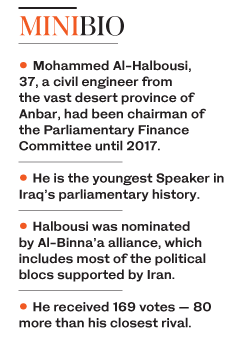BAGHDAD: Rival blocs in Iraq’s Parliament ended a political stalemate on Saturday and elected a Speaker and his two deputies.
The move is the first step in the formation of a government after months of wrangling since elections in May.
MPs elected a Sunni to head the Parliament, a Shiite as first deputy and a Kurd as second deputy, in a return to the power-sharing system adopted since the 2003 US-led invasion that toppled Saddam Hussein.
Mohammed Al-Halbousi, 37, a civil engineer from the vast desert province of Anbar, had been chairman of the Parliamentary Finance Committee until 2017. He is the youngest Speaker in Iraq’s parliamentary history.
Halbousi was nominated by Al-Binna’a alliance, which includes most of the political blocs supported by Iran. He received 169 votes — 80 more than his closest rival.
“The selection of a young Iraqi to fill the post of Speaker is an important development that sends a firm message to the former politicians that they have to leave and make way for the new generation,” said Khamis Al-Khanjar, one of Iraq’s key Sunni figures.
There were no clashes on Saturday between Al-Binna’a and the Reform coalition sponsored by Moqtada Al-Sadr, one of Iraq’s most influential Shiite clerics, who is supported by the US. The last session on Sept. 3 ended in acrimony, when each claimed they had the largest number of seats and should be allowed to form a government. Violent protests broke out in Basra the next day, killing at least 15 people.
Arab News reported on Friday that agreement had been reached between Al-Sadr and his rivals to include some pro-Iran factions in his coalition. Evidence of the deal emerged during Saturday’s parliamentary session.
Al-Binna’a MPs stepped down after their candidate won the post of Speaker, and announced the withdrawal of their candidate for first deputy to allow Sadr’s candidate to take the position.
“The results of the session of Parliament indicate that the agreement between Al-Binna’a and the Reform coalitions can overcome the obstacles and lead the political scene toward the destination they want,” a prominent Shiite lawmaker involved in the talks to form the government told Arab News.
“The conclusion suggests that Al-Binna’a and Reform together are in practice the largest bloc and the real decision maker.
“So, they both silently agreed to not talk about the biggest bloc this time, and the negotiations will move on to form the government as they have been planning.”






















